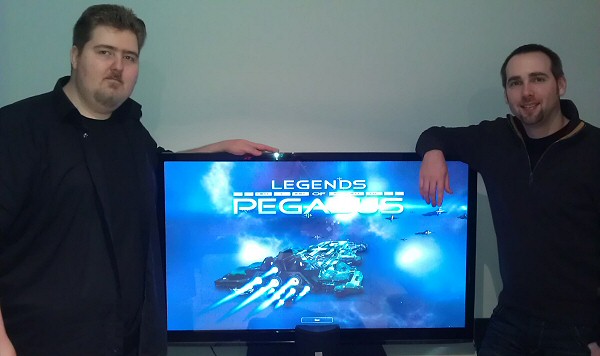
Peter and Andre from Novacore Studios (Legends of Pegasus)
Legends of Pegasus is a new 4X space game that is currently under development by Novacore Studios, with a target release for Q2 2012. I’ve been following this title for some time now, but apart from a few screenshots I sensed that I knew very little about this new 4X space strategy game. So, I got in touch with the developers at Novacore Studios in order to know more about it, and to share with you guys what I could unveil about this new promising game. Novacore Studios’ CEO Andre Overhagen kindly accepted to supply some of his time to enlighten us a bit more on their game. Here is what Andre had to say about it:
SS: Where did the idea for developing Legends of Pegasus came from?
Andre Overhagen: My partner Peter Seydel and I have always been big fans of the 4X genre. We’ve grown up with titles like Ascendancy and the Master of Orion series and loved them. So it was only natural that our first game should fall in this category. In the beginning, we chose Pegasus just as a working title, but over time we’ve grown so fond of it that we decided to develop the story based on the name. And this is how Legends of Pegasus came to be.
SS: Tell us more about the different real-time and turn-based gameplay mechanics. How, and when, are they used, and how do they mix together? I mean how is the transition between the two modes achieved?
Andre Overhagen: The game is a classic turn-based strategy title. The only difference is that encounters take place in real-time. This means that if you encounter an enemy faction, you’ll switch to a real-time combat at the end of the turn. Instead of loading an instanced combat map however, the combat takes place right where the enemy ships met. So you may end up fighting next to your settled or upgraded planets, leaving them as well as structures in the orbit open to real-time attacks. Resulting changes to the game environment will be reflected in the following strategy phase.
SS: Please talk a bit about the graphics, sounds and music in Legends of Pegasus.
Andre Overhagen: Our graphics is based on DirectX 9 to make sure that even players with older or less powerful graphic adapters can enjoy Legends of Pegasus. Nevertheless the game offers high resolution textures for impressive graphics that are basically unrivalled in this genre. All sounds and music tracks were created by our own composer in collaboration with external music and sound designers. Our dynamic music and sound system creates a very distinct feeling for each race and offers an atmospheric sound environment for space encounters. A live voice kit enables varying messages from allied ships and background radio messages during combat.
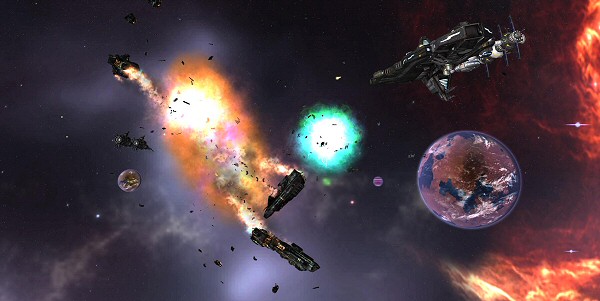
The fact that Legends of Pegasus will have a big single-player campaign is very interesting, since this deviates from the 4X tendency, where games are usually played in sand-box mode. Tell us more about the campaign, and the story behind it (also a bit of the lore). How does that all fit with the game’s victory conditions (the end game)? Is there a sand-box gameplay mode also available? If not how have you planned to tackled a possible lack of game replayability?
Andre Overhagen: During the campaign, you play as the main character “Daniels”. As you guide him through all three factions, you’ll have a chance to try out all playable races in the game. The story is set during an attack war on Earth. You’ll start out with a few surviving human space ships that get sucked through a wormhole, unaware of what happened or why they ended up in a totally unknown galaxy. In the course of the campaign, players will unveil the details and reasons behind this event.
The campaign contains several mission targets that players must complete. However, how you achieve your targets, how many planets you colonize and whether you opt for a more defensive or aggressive approach is completely up to you. Virtually all of the free game features are also available in the campaign mode. The storyline itself consists of three consecutive campaigns with several missions. During the whole story, the universe remains persistent, meaning that your next mission starts of exactly where you ended the previous one. So choose your actions wisely as they will have an impact on your future approach.
\Edit (Feb 7, 2012): Andre Overhagen: “Sorry i missed this one. Yes, we will definitely have a sandbox mode :)”
SS: I understand that there are different races in Legends of Pegasus. How will they play exactly? Are there different campaigns available for each race? How many races are there in total? Are all of them playable?
Andre Overhagen: Legends of Pegasus offers three playable races. Each race has its own economy system and different flaws and strengths in terms of production, combat power of the space ships etc. Apart from the race, players can choose an origin. These origins all have a different focus and introduce even more flaws and strengths to the races to further differentiate them. Players can even create their own origin to fully customize a race; e. g. set the focus on research, production or trade. These customizations can be saved and reused in future matches.
SS: The ship modularity concept seems fantastic. Tell us more about it. Can ship modules be damaged / targeted individually? What about the ship design itself, Kalypso Media talks about ship design as an “intuitive building system”. What does that mean exactly?
Andre Overhagen: The game contains a ship editor which players can use to freely create their ships. The available components depend on what you’ve researched so far. Based on the general body size (e. g. Corvette or Destroyer) players will equip their ship with different modules. These modules have special purposes. Players can e. g. opt for military equipment to achieve better armoring and more weapon slots or research equipment to improve sensors and scanners. This basic setup offers slots for different components like weapons, drives, scanners etc., which are added by simply dragging and dropping them on the ship. The different components equipped determine the ship’s abilities. As players become technologically advanced, they can specifically target the different systems of an enemy ship. If a ship is hit, all equipped components will suffer damage, impacting and eventually destroying their function.
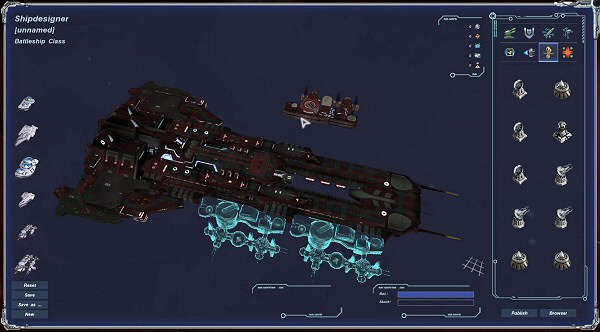
SS: Will Legends of Pegasus focus more on some aspects of 4X, like space combat, ship design or colony development? Or will it offer a balanced mix of features. Tell us more about the available features. For example, will there be diplomacy options? Espionage? Trade?
Andre Overhagen: Legends of Pegasus focuses mainly on its complex economy management, custom designing of space ships and tactical real-time combat. The economy management comprises expanding and managing colonies, relations and trading with other factions as well as gathering resources. During real-time combat the aim is to command your custom designed ships into battle and put their abilities to best use. Aside from devising a clever tactic, your success also depends on whether you picked the right abilities of your ships and the right constellation of your fleet.
SS: Now, about the research system, what can you advance more about it? Kalypso Media announces “hundred of technologies to research in dynamic and extensive tech trees”. Does that mean that there will be random elements to the tech trees? Tell us a bit more about it.
Andre Overhagen: Each race in Legends of Pegasus has its own tech tree. Depending on the race’s focus, these trees contain some exclusive technologies that cannot be found in other tech trees. On top of that, players can add so called “free tech trees” at the beginning of a game. These trees have their own focus and offer more aggressive or more defensive technologies or boost your research or industry. With this system, players can pick the tech trees that best match their playing style, offering lots of different combinations.
SS: So, we can develop our colonies using a slot (1 unit per slot) system. What kinds of structures can we build in our colonies?
Andre Overhagen: Apart from classic structures like factories, research institutions and defense structures you will be able to build structures that target economy and environmental factors. Players are not only able to build structures on the planet itself, but also within its orbit, e. g. space stations where you can build your ships. This is done via a very simple and intuitive drag-and-drop system.
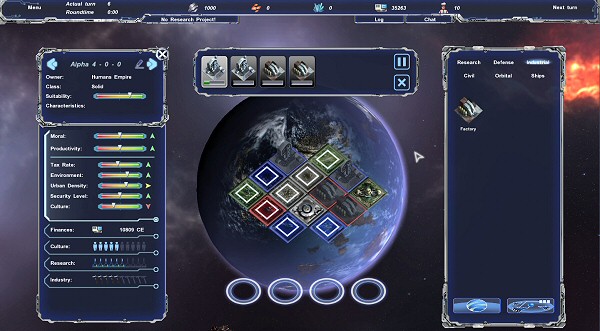
SS: How will the game be released? Both in physical and digital form? If digital which digital distribution platform(s) are you planning to sell it on?
Andre Overhagen: The game will be available in store as well as online. Digital copies will be available via Steam.
SS: Legends of Pegasus release date is targeted for Q2 2012 in Kalypso Media’s website. Can you advance a more detailed release date at this stage? Kalypso also mentions PC DVD-ROM in Legends of Pegasus’ page, so does this means that LoP will be released exclusively for the Windows PC? Will there be a demo?
Andre Overhagen: Sorry, but we can’t give you a more specific release date yet. We can only confirm that we’re aiming for Q2 2012. I can definitely confirm however that the game will be a Windows-PC only title by the time of release.
SS: Can you tell us some of your lessons learned in developing Legends of Pegasus? Successes, failures and doubts you have bumped into, so that other people may benefit from your experience in developing even greater 4X space games in the future?
Andre Overhagen: My advice is to create a playable version that reflects the basic concepts of the game as soon as possible. Like this, you are able to identify weaknesses in the game design at an early developing stage to avoid major changes to basic elements later on. In our opinion, the key to a good game is combining proven game mechanics with innovative gameplay. You should also make sure to separate the game in main and side features from the very beginning. This gives you the flexibility to react if certain components don’t work out the way you’ve planned it without compromising the original idea of the game.
I would like to thank to the Novacore Studios Team, and particularly to their CEO Andre Overhagen for taking the time out of their busy days to do this interview. You can check out the official Legends of Pegasus website for more info. You can also check the Novacore Studios homepage. Some screenshots here.
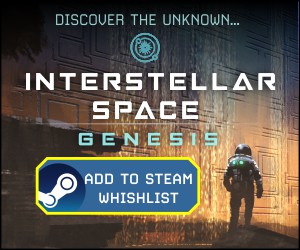
34 Comments
Related Articles:
- Legends of Pegasus Released
- Legends of Pegasus: New Trailer, Release Info and Pre-Order Details
- Legends of Pegasus Now Available for Pre-Order on Steam
- Legends of Pegasus Pushed Back to the Summer
- Legends of Pegasus: Novacore Studios Filed Bankruptcy

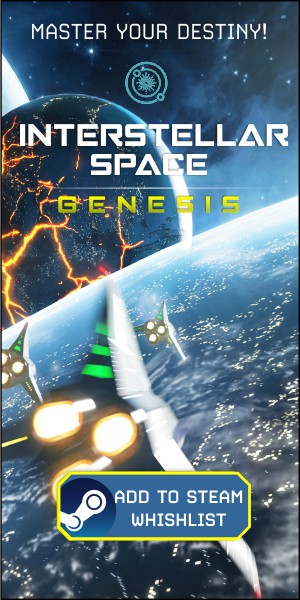
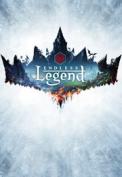




The screen shots are beautiful! Great review Adam, looking forward to trying it out when it is released!
Yea, they are nice. There aren’t many shots available yet, and no gameplay trailer also (besides the one from 6 months ago at Gamescom) but the combat scenes do look spectacular.
Excellent preview! I’m really interested to see how the combat system works now. I watched last year’s preview video, but the relationship between the strategic and tactical games wasn’t obvious.
Thanks zigzag. We do have a bit more to chew on now. It was good to know that combat and the strategic parts of the game blend in smooth transitions, without taking you away from scene. I already suspected that but now it has been confirmed to be the case.
As a side note: There are a bunch of great looking 4X space games of lately. SotS2 space combat, for the most part, is absolutely gorgeous. StarDrive looks are also impressive. I was quite amazed with StarDrive’s planets and stars rendering. Legends of Pegasus seems to be also very good looking. The trick, as always, is to nail the graphics quality with great gameplay, which is a very hard and rare thing to come by.
And more importantly, its combat engine looks good while still including the features that, in my opinion, create the best micromanagement opportunities. i.e. 2.5D and not 3D movement, turn-then-move and not turn-and-move locomotion, etc.
Also, do you know if combats are resolved simultaneously or sequentially?
If you’re referring to the gameplay mechanic it’s real-time, so, all the combat happens simultaneously as we can see in the early gameplay trailer.
So you could potentially need to manage multiple battles in multiple locations at the same time?
Ha, that. Most probably not. Guess it’s an encounter at a time. So, time freezes, you manage that fight and after that you move to the next one. But I’m just speculating here.
thanks for the preview, Adam. I’m not sure the question has been clearly answered, the game seems to have no sandbox mode, is that right?
Unfortunately Andre was not clear on that point. A lapse perhaps (the question was indeed big). That, or the conclusion is that probably there’s no sand-box mode, although I would find that surprising.
Andreas has come back to me with confirmation that there will be indeed a sand-box mode.
Andre Overhagen: “Sorry i missed this one. Yes, we will definitely have a sandbox mode :)”
Ufff… :)
Great interview, I hope more like this will come. :)
Thanks! Sure, there will be more, you can count on that. In fact there is one other interview I will publish very soon about another upcoming sci-fi RTS that looks very promising. This one slipped through and was not in the sci-fi/space games list for 2012, but it looks very interesting. So, to know which one is it just stay tuned for the next few days ;)
My thoughts exactly.
I will definitely give this one a try. This is the first dev that I can remember that has mentioned Ascendancy as an inspiration. That title gets over looked a lot but I have always thought it a classic. One thing I am puzzled by in that there are only 3 races. That seems a bit sparse and I wonder why they chose a small number. I’m guessing it has to do with the application of the campaign mode.
Yes, Ascendancy inspiration, good point. In fact other people have noticed that inspiration by looking at the screenshots (the slot-based colony management screen above in the interview). Yes, I would bet also that the reduced number of races has to do with the campaigns, otherwise the task would probably be too daunting.
I’m particularly excited about the campaigns because till this day I didn’t see anyone pull that off decently in a 4X game. Let’s hope that comes out as interesting gameplay and not as some boring scenarios that no one cares about. The fact that sand-box mode is confirmed is also promising. Legends of Pegasus seems to have it all, let’s see what it got.
Im very pleased with fewer races because that means there is more room for them to create races with great differences, not just other graphics and an slightly alternated techtree
Yea, it’s refreshing to see new ideas in 4X games. Fewer (hopefully more detailed) races, and campaigns! Uau. I’m curious to say the least.
Thanks for clarification on the sandbox mode and the interview in general. I’m going to to refrain from getting overly excited due to the huge letdown I had last year in the space 4x genre, but I am going to be keeping a very close eye on this title. I like what I am hearing so far, although I’m anxious to see how the diplomacy really pans out.
I’m still waiting for a game to fill that void MoO2 once filled. Whether that will be a new game released this year, a fully patched SotSII, or a sale on Distant Worlds + expansions that finally gets me to buy, remains to be seen. I wish more games had an AI that could tell when the player was pulling far ahead of them and would actively work to form alliances and take measures to prevent their demise. I remember playing Europa Universalis II for the first time and being amazed at how the AI reacted when I started overextending myself (and became a bit of a warmonger). Staying at war for long periods of time or without justification was a death sentence. I just want that same type of interaction in a game with richer combat and UI, and preferably in space.
That’s a good observation, I also miss a stronger AI, especially in what comes to diplomacy as you mention. Something like Civ 4 BTS on a space 4X game, where long wars are very costly (as you point out), and you must pick your friends VERY carefully, and backstab them eventually “as a necessity” (that Civ’s so realistic feeling that is inevitable to go to war at some point for resources claim).
The solution is to make resources more critical and scarcer, but I have a feeling that 4X game developers are afraid to go that road because they think it will be very hard to balance that resources-scarcity system (and probably they’re right). Unavoidably you need to put many hours of testing to assure that your game doesn’t become too hard (or impossible to win) or that it doesn’t became too easy with too many resources available with no real conflict. This is one issue I have with Distant Worlds in fact. The resource model is great (many meaningful resources) but then I think DW’s devs fell short by not taking the resource system further and use that to cause more tension and rivalry. I’m sure they thought about it but probably dreaded the need to do that further balancing test.
Yes, a deeper political and diplomatic gameplay could be one of the things that are missing in 4X space games. Usually there are no significant consequences in waging war for too long (although there’s war wariness in Distant Worlds for example).
This is a wonderful preview of things to look forward to. I was fascinated that the developers seem to put so much stock in the economic simulation aspect of the game. Without a doubt, this is my favorite facet of the genre. Yes yes, space combat is good and all, but its the joy of building and expanding an empire, setting up those mining colonies and seeing them pay dividends for generations, that really keeps me coming back to the genre. But it seems like so much of 4x gaming has spiraled into a multiplayer-oriented min/max combat sim. I find the “7 races all discover space travel simultaneously NOW GO” concept more and more tired every day.
It appears that pegasus is giving us a lot of classic 4x space gameplay here, but by sticking it in the Sim category rather than strictly in the Strategy category gives me a lot to look forward to. I was pleased with Tropico 4, so lets hope Kalypso gives us something to hope for.
Great interview, adam. Look forward to more updates on this and other games in the space-space!
Thanks Thiosk. Don’t worry, more will come, on Legends of Pegasus and much more.
Good points all around on the case of less being more when it comes to races. It certainly is easier for a developer to put a lot of creative and design power behind the creation of 3 unique races as opposed to a dozen somewhat dis-similar (but mostly the same) races. The origins idea sounds like a good way to represent different sects of the same race, since we all know that humans, for instance, are not all alike or friendly with one another. This allows for more than 3 “factions” in the game to keep things interesting without feeling watered down, hopefully.
I agree that resources can be a point of contention/reason for war. Balancing could be hard, but if we step back to the racial differences again, it wouldn’t be that hard to make some resources more valuable, or perhaps of different value, to each race. For instance, certain metals on a world may be valuable to humans because they need it for a lot of their tech research or for production of weaponry. For another race, that same metal may be used for their engine or biochemical techs. For a third, that metal may be a consumable food/energy source that they need in order to grow their races population. These are of course rough ideas, but the point is I’ve now made that metal on that planet valuable to all the races, but all for different reasons.
Another option is to limit terraforming and dome type technologies in the early-mid game to force players to contend with others to find suitable homeworlds. Including a “zone of influence” around owned planetary space would force players to seek an agreement to cross that space or risk going to war. Acting aggressively in this case would cause other races/nations to grow weary of, or perhaps outright offensive towards the player. Add in some political/social implications of war weariness/protest amongst your own planets and you’ve now made the diplomatic and social aspect of the game nearly as important as the warfare one.
It could be that I am thinking of more of a niche type of gameplay and that most people prefer the constant warfare in space that most 4x games feature. I just know I realized quickly in Europa Universalis II that going to war was a very serious action that hurt my home economy and caused me to get into hot water with other nations… and I loved that aspect of that game. War is fun and I love ship combat, but I also like the feeling that I get when I realize I can’t just steamroll the AI while they all sit there and watch.
Awesome interview. this was informative. I like single-player campaign…
Thanks onigi. Yes, the single-player campaign is a very interesting aspect of LoP. In fact on of the things in the game I’m most looking for. For many reasons.
Another huge Ascendancy fan here. Yes, the screenies are very reminiscent of that classic game. The Logic Factory has just released an ‘Ascendancy’ for iPad, phones, etc. I’m told they’re working on an ‘Ascendancy II’, but I’m not holding my breath. Until then I’ll be sure to try this when it comes out.
Ascendancy II hem? I’ll keep an eye on that.
I also saw a huge Ascendancy(DOS version) influence with the game as well after seeing the game play trailer and screen shots. I still think of Ascendancy as one of the best 4x games I’ve played.
I am really looking forward to this game, especially with its ‘ship design by component’ system. I used to love Space Empires V (Which is a really really outdated game now), and its ship design system. What I also loved about that game was that the research tree was extensive enough that everyone started off on the same page, but if an area was focused on for long enough, it could give you a strong advantage in an area (Eg- Shields with huge regenerative capabilities, long range high energy discharge weapons, or super engines allowing you to outrun anything!). However, long periods of research became very expensive and your technologies in other areas could become quite dismal. That game was very polished in terms of its vision, extraordinary number of options (fighters, drones, troops, ships, planet based weapon platforms, mines, satellites, starbases, many weapons with special abilities, etc) and balance (especially with Balance Mod installed)- but was severly lacking in the AI department which was always a letdown. (Im not asking for an emulation of this game by the way! Just reminiscing)
Anyway, I hope you guys focus on getting this game done right, rather than releasing it too quickly with lots of flaws and bugs. Im looking forward to the new features as they are slowly revealed to us. All the best and I wish you every success!
I also have high hopes for the component-based ship design system. With respect to research I found interesting what Andre Overhagen has said about it. The core seems to be the usual stuff (fixed tech trees with some special techs to each faction) but I was intrigued with the part he says “players can add so called “free tech trees” at the beginning of a game (…) with this system, players can pick the tech trees that best match their playing style, offering lots of different combinations”. Interesting.
I like the SE’s universe although there was something about it that didn’t completely satisfied me (I played much more SEIV than SEV though). Maybe it was its soulless aspect, the dryness or the lack of proper objectives. Can’t really put my finger on it, probably it was a multitude of issues. I should make an effort to review SEIV and SEV soon, but … there seems to be always other things to cover, fortunately. I say fortunately in the sense there is lots to talk about in the genre.
If you ever feel in the mood to review SE games let me know. By your description I guess you could be up to the jog, since it seems like you have deep knowledge about it but in a (good) dispassionate way.
i used to be part of the development team of novacore in the early stages of this game and it was pure fun, and i am looking forward to finally see it released!
Its a pity these guys went bust.
I guess they were put under too much pressure when it came to their release date
Yea, it was really sad, all that happened with LoP’s release. We never knew exactly what happened and what went wrong, so that they had to release the game in that state. But, we can guess it was too much pressure with the release date as you say, or perhaps a very bad testing plan. We could speculate for hours and never reach the real reasons, as usual on this sort of delicate situations. In the end, everybody lost.